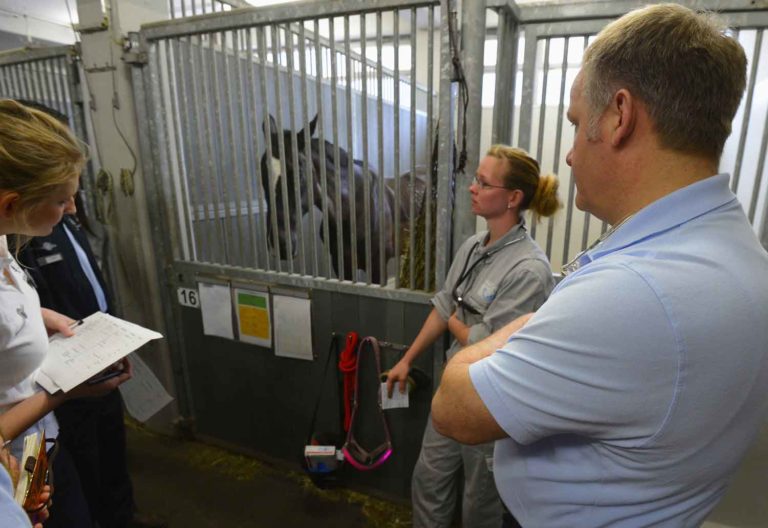
Editor’s note: One of the best horsemen I’ve ever known—who has had mules for decades—said something to me one time that has stuck with me over the years: “Mules is different.”
In Episode 92 of the Disease Du Jour podcast, we talk to Amy Mclean, PhD, an assistant professor of teaching at the University of California, Davis, College of Veterinary Medicine. We discuss what veterinarians and vet techs need to know about mule and donkey physiology and behavior to better care for these patients.
“Mules are different, and donkeys are even more different,” quipped Mclean. “Their behavior is different from a horse. A horse is more forgiving. Donkeys and mules are more cognitive…that’s been proven by research. They are extremely cautious. They seem to ask, ‘Why do I need to do this?’ So you have to work with them and not try to be dominate”
In the podcast, Mclean has some basic tips for veterinarians and vet techs who have not worked with a mule or donkey before.
“First, you don’t get to know them the same as you do a new horse,” she said. “It’s like dating; start face-to-face. You reach your hand out and let them reach out to you. Go slow. Work your way up the face scratching. Be patient. If you rush, they won’t trust you.”
She also advised that while a veterinarians might have a technician handle horse patients, it often is wise to let a mule or donkey owner handle that animal, especially if they have a bond.
“If the mule trusts the owner, you might need to get them to help you examine the mule,” said Mclean. “You might need the owner to take a rectal temperature, for example.”
She reminded vets and techs that mules are very agile. While handlers feel pretty safe at the shoulder of a horse, “a mule can kick you with a hind leg if you are standing at their shoulder,” said Mclean.
She said mules and donkeys have more of a “fight” instinct than horses, and you can’t manhandle them very well. However, “a nose twitch works well, as does a blindfold or pharmaceutical restraint.”
For chemical restraint, she advised that veterinarians look up recommended dosages for donkeys and mules because they are different from horses. It usually takes more to sedate a mule or donkey.
Mclean also reminded practitioners and their assistants that donkeys and mules need vaccinations, dental work and farrier care just like horses. “Don’t ignore those,” she said.
Basic Physiology
Mclean said there is a base temperature difference between mules, donkeys and horses. “A donkey is 98.5, which is lower than a horse,” she said. “A mule is about 99, and a henny is 98.5-99. So if you see a donkey with a temperature of 101, you might miss that sign if you are thinking of it the same as a horse.”
She also reminded that mules and donkeys are very stoic; they don’t show signs of lameness and pain as quickly as a horse would. And if a donkey quits eating, it is bad. “When a donkey stops eating, it’s a dead donkey,” she said. “A donkey will eat until it dies.”
Mclean said that donkey and mule skins are thicker, and that their veins are harder to go venipuncture because the is a muscle covering the vein. “Go higher up on the neck to access the jugular,” she advised. “And use an 18-22 gauge needle.”
While most vaccines have not been researched in donkeys and mules, Mclean said those animals need vaccinated just like horses. “Donkeys are very susceptible to tetanus, flu, West Nile virus and EPM,” she noted.
Weight Control
Managing body weight of donkeys is difficult, Mclean conceded. “We have been studying the donkeys in Death Valley, and the wild burros thrive there!” she said. “If you have them on lush pasture and not a desert, you’re going to have to limit grazing. And donkeys get depressed when you put a grazing muzzle on them.”
She said more research is being done on donkey metabolic syndrome, because the values are different from horses. “We are currently trying to work on preventing metabolic disease in donkeys,” she said.
More
Make sure to listen to this podcast if you have any donkeys or mules in your practice. They are becoming more popular, especially donkeys as pasture pets.
Mclean reminded veterinarians and vet techs that when it comes to donkeys and mules, “You gotta understand them before you can take care of them.”
Definitions
A hinny is the offspring of a male horse (a stallion) and a female donkey (a jenny). A mule is the offspring of a male donkey (a jack) and a female horse (a mare).
About Dr. Amy Mclean
Dr. Amy Mclean received her BS in Animal Science with an equine emphasis at the University of Georgia. She received her Masters from the University of Georgia and her PhD from Michigan State University. Her research interests include improving equine management, behavior and welfare with a specific interest in donkeys, mules, hinnies and working equids in developing countries.

![[Aggregator] Downloaded image for imported item #18782](https://s3.amazonaws.com/wp-s3-equimanagement.com/wp-content/uploads/2025/11/03125751/EDCC-Unbranded-13-scaled-1-768x512.jpeg)
![[Aggregator] Downloaded image for imported item #18375](https://s3.amazonaws.com/wp-s3-equimanagement.com/wp-content/uploads/2025/09/30140031/EDCC-Unbranded-26-scaled-1-768x512.jpeg)

